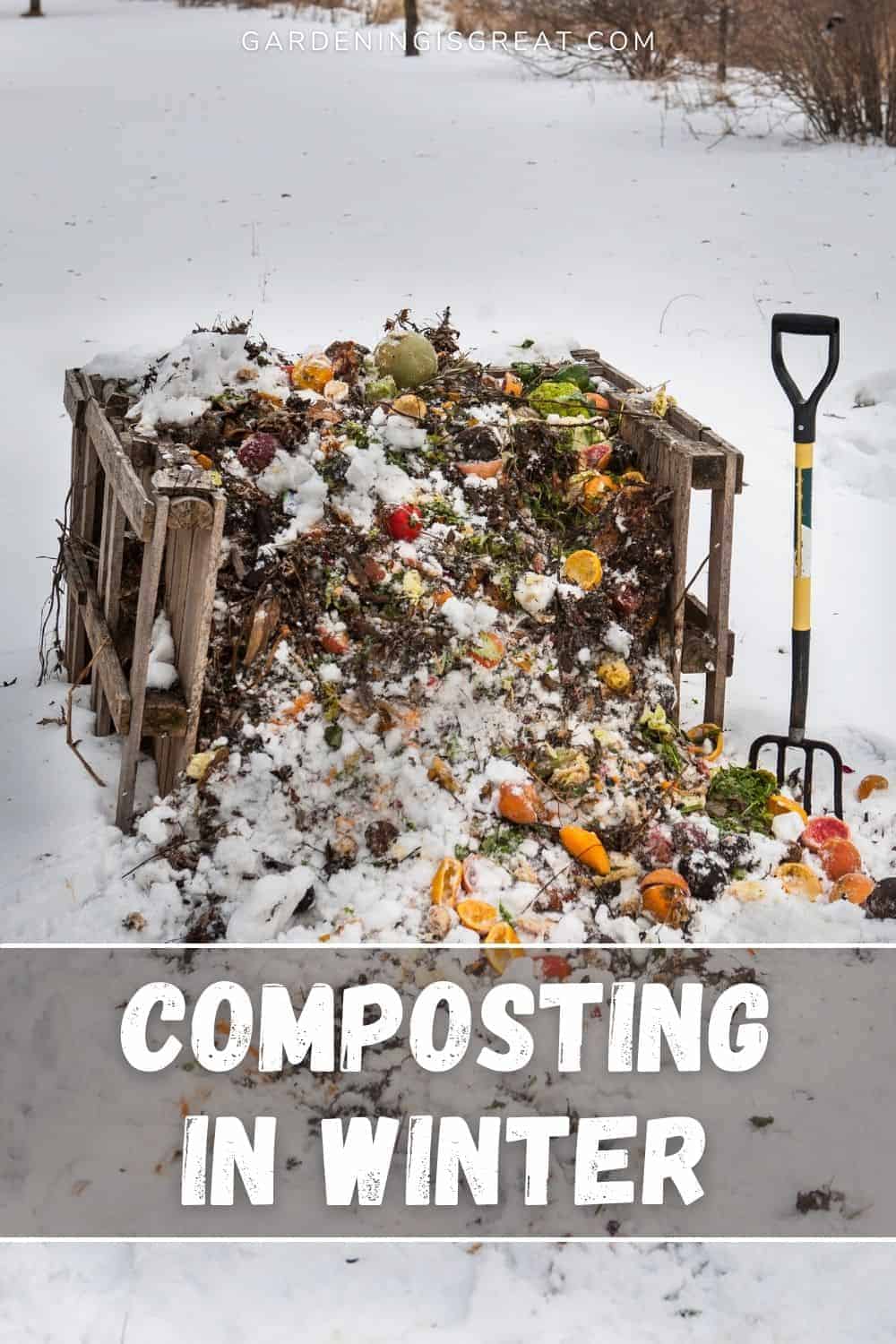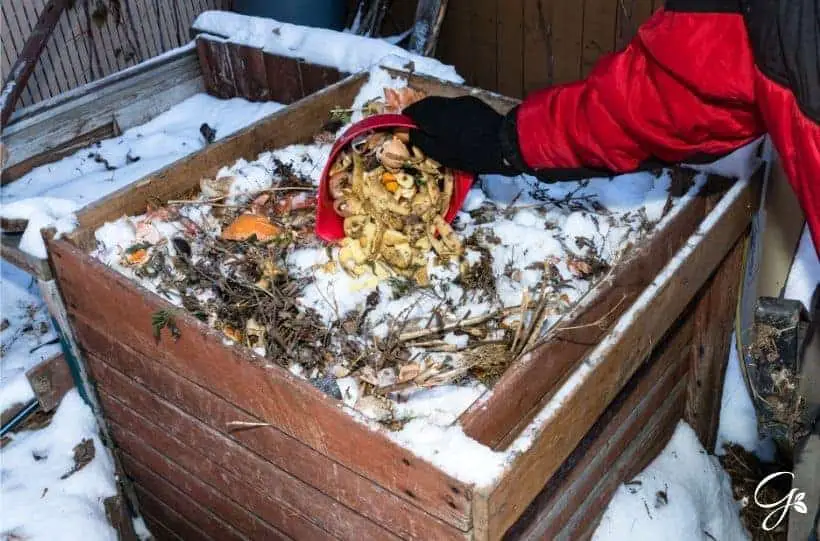A Complete Guide To Composting In Winter
This post may contain affiliate links. Please see the privacy policy for details.
Compost is a gardener’s best friend offering a healthy, nutrient-rich material to add to the soil around your plants. Compost has several benefits including:
- Providing nutrients to your crops
- Reducing household waste
- Offering a natural, chemical-free resource to your garden.
If you live in an area that experiences temperature drops and harsh weather during the winter months, composting in winter can seem like a challenging task.
But with a little bit of preparation, the right materials, and time, you can continue composting in winter with your compost ready to be used in Spring.
Read through this complete guide to help you continue composting in winter.

Can You Keep Composting In Winter?
The great news is that you can keep composting during winter. It is more of a challenge due to colder temperatures. However, with some TLC and providing the right materials and conditions, you can still compost materials during winter in time for being able to use in spring.
What Are Ideal Conditions For Compost To Decompose?
The materials added to your compost heap take time to decompose into a material that can be used in your garden.
The warmer the compost, the faster it decomposes, hence why summer is the ideal season to grow your compost heap.
Compost requires several components for the process to take place:
- Organic matter e.g. leaves, grass clippings, fruit and vegetable skins
- Moisture
- Oxygen
- Bacteria.
All of these components work together to decompose your compost. Heat is also important as, without heat, the process slows down considerably.
When composting in winter, you need to take these factors into considerations to help support your compost to continue decomposing. Without intervention, your compost may become too moist, lose essential heat, or decrease the number of microorganisms.
How To Store Compost In The Winter?
As compost is sensitive to getting too wet, it is best to use a covered container such as this bin compared to an open heap.
An open heap is open to the elements. We all know too well that winters can be cold, windy, and damp with rain and snow.
If you leave your compost this way, it will become too cold and damp to decompose and important microorganisms that feed on your compost trimmings will perish.
Whereas a compost bin with a lid is completely contained. This helps retain essential heat whilst protecting it from varying cold weather.
How Do You Take Care Of Compost In The Winter?
There are several things you should do to take care of compost in the winter:
Add Fresh Materials
Compost needs fresh materials to be added frequently to feed the microorganisms living in your compost that help decompose items.
You cannot produce compost without supplying organic matter e.g. clippings from the garden or coffee granules.
Turning Your Compost
During the summer, compost needs to turn regularly to help improve a steady supply of oxygen.
However, if you turn your compost in the winter too often, you end up releasing essential heat.
It is best to limit turning your compost to once every two weeks. This ensures you help your compost retain its heat whilst also adding oxygen and helping your compost to decompose faster.
Insulate Your Compost
As mentioned, keeping your compost warm is needed to ensure microorganisms survive and that your compost continues to decompose during the winter. But as temperatures decrease, this can be increasingly challenging to achieve.
One method of helping your compost retain its heat is to add insulation around the outside of your compost bin. You can add leaves, straw, sawdust, or even paper into bin liners and surround the outside of your compost bin. Or, add layers of these items directly into your compost bin.
Shred Your Compost
Decomposition takes a lot longer during the winter due to colder temperatures. To make it easier and help speed up the process, add smaller items to your compost.
It does take a few more minutes of your time, but shredding or tearing organic matter into smaller pieces will make it easier for them to decompose
Select A Sunny Spot
When trying to retain heat in your compost pile, consider moving your compost bin to a sunnier position in your garden.
The natural heat from the sun will help warm your compost, especially if your compost bin is black. Black is a natural insulator and retains more of the sun’s heat compared with a lighter color.
To help move your compost bin, ensure to remove any ready-to-use compost from the summer and add it to your garden. This will lighten your bin and make it easier for you to move, plus, provide beneficial nutrients to your plants during the winter months.
What Should You Add To Compost In Winter?
To ensure compost retains as much heat as possible in winter and does not become too wet, it is best to rotate the organic materials you add.
Material can be listed in two categories:
- Browns
- Greens.
Brown materials include paper, cardboard, wood chippings, and prunings from your garden. These materials help add carbon to your compost heap.
Whereas green materials include grass clippings, vegetable, and fruit waste, and leaves. These contribute nitrogen to your compost.
Both are essential for providing the right nutrients so that your compost is beneficial for your plants.
To help the decomposing process and ensure your compost does not become too wet, you need to rotate what is added.
For example, if you have added a layer of brown materials e.g. shredded paper, you will want to add green materials next such as kitchen waste.
Keeping this balance of materials is important. When doing so, it is a good idea to also check the texture of your compost.
It is equally important to ensure your compost is moist, as it is making sure it doesn’t become too wet. If your compost begins to feel quite dry, add a cup or two of water to help it feel wet similar to a rung-out sponge.

Following this guide to composting in winter will help ensure your compost continues to decompose throughout the colder months. By the time spring arrives, with the necessary care given, your compost should be ready to be used in your garden.
Take a look at these posts to help you produce beneficial, nutrient-rich compost for your garden:
